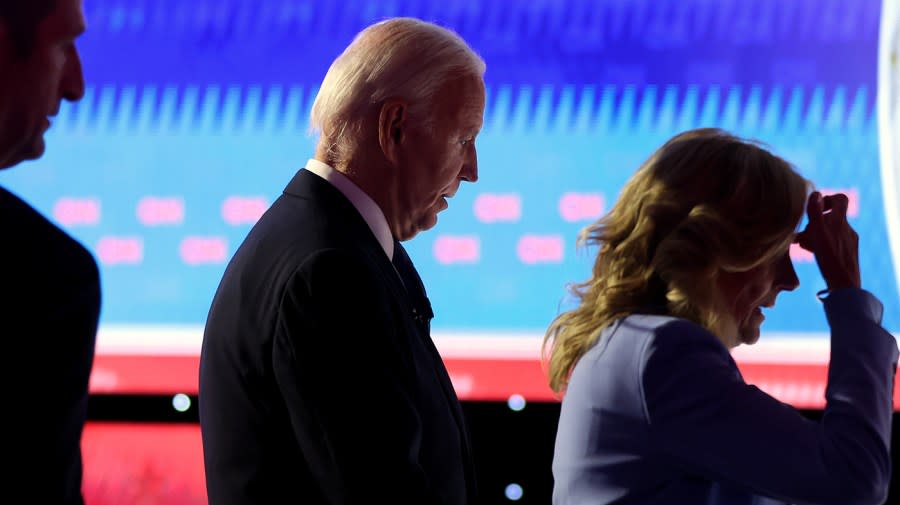The Memo: The debate that changed everything

ATLANTA — Never before has a debate transformed a presidential race so utterly.
The idea of replacing President Biden as his party’s 2024 nominee has become Topic A in national politics; former President Trump has advanced from a slight to heavy favorite in November’s election; and the collective blood pressure of the Democratic Party has gone through the roof.
It all happened in about 90 minutes on a debate stage here on Thursday night.
For Biden, it really was that bad.
“The worst performance in debate history” was the verdict of one Democratic strategist texting with this reporter while the clash at the CNN studios was still happening.
“A f???ing disaster,” former President Obama speechwriter-turned-podcaster Jon Favreau told his “Pod Save America” audience soon afterward.
Biden has, to be sure, always had detractors in the party. And relations between his aides and those of Obama have often been taut. But throughout Thursday night and Friday, voices normally supportive of Biden were raised in alarm.
New York Times columnist Thomas Friedman penned a piece noting his long friendship with the president but calling on him to exit the race. Former Sen. Claire McCaskill (D-Mo) told MSNBC’s Rachel Maddow there were “glaring weaknesses in our president.” Also on MSNBC, Joe Scarborough predicted a Trump victory in November “unless there’s a change.”
The stumbling nature of Biden’s performance and the problems it caused are not in doubt.
A quick CNN poll of debate-watchers on the night found that they believed by a 2-to-1 that Trump had been the victor. Speaking to a crowd in Raleigh, N.C., on Friday, even Biden acknowledged, “I don’t debate as well as I used to.”
The question for Democrats: What now?
The obvious answer — but one that is risky and without modern precedent — would be to persuade Biden to step aside.
The president has, technically, got his party’s nomination locked up. Having faced only token opposition in the primaries, he has more than enough delegates lined up to support him when the nomination is officially decided at the Democratic National Convention, scheduled for Chicago in mid-August.
The only real chance of the nomination being wrested from his hands is if he surrenders it.
There has been speculation that senior figures in the party, perhaps including Senate Majority Leader Chuck Schumer (D-N.Y.) or even Obama himself, could be induced to approach Biden about stepping aside.
But such a scenario remains entirely hypothetical.
Schumer on social media welcomed Thursday’s debate as one that had “made the choice clear” in November.
Obama, writing on the social platform X, sympathized, “Bad debate nights happen. Trust me, I know.”
But, the former president added, “this election is still a choice between someone who has fought for ordinary folks his entire life and someone who only cares about himself.”
Among others who could counsel Biden are the coterie of aides who have been close with him for years. This group includes senior adviser Mike Donilon, presidential counselor Steve Ricchetti and former White House chief of staff Ron Klain. But they are so loyal to the boss that it requires a gymnastic leap of imagination to visualize them urging him to head for the exit.
Any decision as momentous as becoming the first incumbent president since Lyndon Johnson not to seek reelection would likely be taken only in combination with Biden’s very closest advisers: first lady Jill Biden and the president’s sister, Valerie Biden Owens, who managed his first campaign for Senate 52 years ago.
Among the broader party, however, it’s easy to see why the terrain has suddenly been transformed.
Before Thursday night, Democrats who had reservations about Biden held their tongues and watched the polls. The president went into the debate lagging Trump by less than 1 percentage point nationally, according to the polling average maintained by The Hill and Decision Desk HQ.
Back in those predebate times, the disruption of trying to dislodge Biden as the nominee looked forbidding, especially given that every alternative candidate has their own weaknesses.
Now, Democrats are shaken, awaiting the post-debate polls, and fearful that the race is slipping toward the point of no return.
In that scenario, faced with a probable loss to a convicted felon and former president who many critics consider an active danger to American democracy, many Democrats feel they would have to roll the dice on someone else.
The likely contenders are easy enough to identify.
A Biden withdrawal would free Vice President Harris to seek the nomination. California Gov. Gavin Newsom (D) has seemed to position himself as a future nominee in waiting, even though his public support for Biden extended to appearing as a surrogate in the spin room here.
Michigan Gov. Gretchen Whitmer (D) is talked up by her fans for her Midwestern appeal, while Illinois Gov. JB Pritzker (D) also has his boosters. Transportation Secretary Pete Buttigieg, who like Harris competed against Biden for the 2020 nomination, is another possibility.
To be sure, it’s important amid such dramatic days to acknowledge politics can be confounding.
Perhaps the next wave of polls won’t be as bad for Biden as is widely feared. Perhaps some other drama will intervene to hurt Trump or reshape the race.
But for now, Democrats are in desperation. They have no easy solution around the corner.
The Memo is a reported column by Niall Stanage.
Copyright 2024 Nexstar Media, Inc. All rights reserved. This material may not be published, broadcast, rewritten, or redistributed.
For the latest news, weather, sports, and streaming video, head to The Hill.
